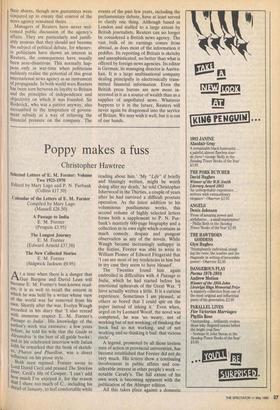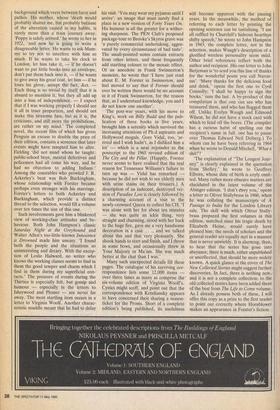Poppy makes a fuss
Christopher Hawtree
Selected Letters of E. M. Forster: Volume Two 1921-1970 Edited by Mary Lago and P. N. Furbank (Collins £17.50) Calendar of the Letters of E. M. Forster Compiled by Mary Lago (Mansell £28.50) A Passage to India E. M. Forster (Penguin £3.95) The Longest Journey E. M. Forster (Edward Arnold £37.50) The New Collected Stories E. M. Forster (Sidgwick Jackson £9.95)
At a time when there is a danger that Guy Burgess and David Lean will become E. M. Forster's best-known read- ers, it is as well to recall the esteem in Which he was held by a writer whose view of the world was far removed from his own. Shortly after the war, Evelyn Waugh recorded in his diary that 'I also reread With immense respect E. M. Forster's Passage to India'. His knowledge of the author's work was extensive: a few years before, he told his wife that the Guide to Alexandria 'is the best of all guide books'; and in his celebrated interview with Julian Jebb he remarked that the book of sketch- e, s, Pharos and Pharillon, was a direct influence on his prose style. Both men repined. Forster wrote to Lord David Cecil and praised The Stricken beer, Cecil's life of Cowper. 'I can't add bONv much I've enjoyed it, for the reason that I share too much of C., including his dread of January, to feel comfortable while reading about him.' My "Life" if briefly and blazingly written, might be worth
doing after my death,' he told Christopher Isherwood in the Thirties, a couple of years after he had survived a difficult prostate
operation. As the latest addition to his voluminous posthumous works, this second volume of highly selected letters forms both a supplement to P. N. Fur- bank's masterly 600-page biography and a collection in its own right which contains as much comedy, despair and pungent observation as any of the novels. While Waugh became increasingly unhappy in the Sixties, Forster was able to write to William Plomer of Edward Fitzgerald that 'I can see most of my tendencies in him but in my case they seem to have blessed'.
The Twenties found him again embroiled in difficulties with A Passage to India, which he had started before his emotional upheavals of the Great War. 'I have actually written a little. It is a curious experience. Sometimes I am pleased, at others so bored that I could spit on the paper instead of inking it.' Even when, urged on by Leonard Woolf, the novel was completed, he was `so weary, not of working but of not working; of thinking the book bad so not working, and of not working and so thinking it bad: that vicious circle'.
A legend, promoted by all those tireless men of action in provincial universities, has become established that Forster did not do very much. His letters show a continuing involvement in public affairs and con- siderable interest in other people's work — notable Cavafy's. The full extent of his own work is becoming apparent with the publication of the Abinger edition.
All this takes place against a domestic background which veers between farce and pathos. His mother, whose 'death would probably shatter me, but probably because of the alteration caused in my habits, is rarely more than a train journey away. Poppy is safely arrived,' he wrote to her in 1922, 'and now he is going to write a disagreeable letter. He wants to ask Mum- my to try not to interfere with him so much. If he wants to take his clock to London, let him take it, — if he doesn't want to put little books into an envelope, don't put them back into it, — if he wants to give away his great coat, let him — if he loses his glove, accept the fact, &ct. — Each thing is so trivial by itself that it is absurd to mention it, but they all add up into a loss of independence. — I expect that if I was working properly I should see it all in truer proportion, and should not make this tiresome fuss, but as it is, the criticisms, and still more the prohibitions, are rather on my mind.' The completed novel, the recent film of which has given Penguin an excuse to double the price of their edition, contains a sentence that later • events might have tempted him to alter. Fielding 'did not mind whom he taught: public-school boys, mental defectives and policemen had all come his way, and he had no objection to adding Indians.' Among the constables who prowled J. R. Ackerley's beat was Bob Buckingham, whose relationship with Forster became perhaps even stronger with his marriage. Forster's letters to both Ackerley and Buckingham, which provide a distinct thread to the selection, would fill a volume over ten times the size of this one.
Such involvements gave him a blinkered view of working-class attitudes and be- haviour. Both John Hampson's classic Saturday Night at the Greyhound and Walter Allen's too-little-known Innocence is Drowned made him uneasy. 'I found both the people and the situations so uninteresting and dreary. With the excep- tion of Leslie Halward, no writer who knows the working classes seems to find in them the good temper and charm which I find in them during my superficial con- tacts.' The pressure of events during the Thirties is especially felt, but gossip and humour — especially in the letters to Isherwood and Plorner — are never far away. The most startling item occurs in a letter to Virginia Woolf. Another charac- teristic muddle meant that he had to delay his visit. 'You may wear my pyjamas until I arrive': an image that must surely find a place in a new version of Forty Years On.
His humour is all the greater for a wither- ing sharpness. The PEN Club's proposed package-tour to Brooke's Skyros grave was 'a purely commercial undertaking, aggra- vated by every circumstance of bad taste'.
The small-pointed notes contain extracts from other letters, and these frequently add startling colours to the mosaic effect. Of an anecdote in Frank Swinnerton's memoirs, he wrote that 'I have just read about E. M. Forster in Swinnerton, and feel moved to say that if Forster should ever be written there would be no account in it of Frank Swinnerton, for the reason that, as I understand knowledge, you and I do not know one another'.
The post-war years, with his move to King's, work on Billy Budd and the pub- lication of three books in five years, brought him a serenity which survived the increasing attentions of Ph.d aspirants and Hollywood moguls. Gore Vidal, too, 'ar- rived and I wish hadn't, as I disliked him a lot' — which is a neat rejoinder to the postscript to the 1965 revised edition of The City and the Pillar. (Happily, Forster never seems to have realised that the real reason for Tennessee Williams's failure to turn up was — Vidal has remarked — ,because he did not wish to see elderly men with urine stains on their trousers.) A description of an indecent, destroyed ver- sion of Paradise Lost is closely followed by a charming account of a visit to the newly-crowned Queen to collect his CH. 'I was alone with her for about ten minutes — she was quite an ickle thing, very straight and charming, stood with her back to the huge fire, gave me a very handsome decoration in a case . . ., and we talked about this and that very pleasantly. She shook hands to start and finish, and I threw in some bows, and occasionally threw in Your Majesty or Ma'am. She was much better at the chat than I was.'
Many such unexpected details fill these pages. The catalogue of his surviving cor- respondence lists some 12,000 items — over three times as many as comprise the six-volume edition of Virginia Woolf s. Cynics might scoff, and point out that the correspondence with Koteliansky appears to have concerned their sharing a season- ticket for the Proms. Short of a complete edition's being published, its usefulness
will become apparent with the passing years. In the meanwhile, the method of referring to each letter by printing the opening sentence can be tantalising. 'I am all ruffled by Churchill's hideous heartless shifty speech,' he wrote to John Hampson in 1943; the complete letter, not in the selection, makes Waugh's description of a glorified wireless personality seem mild. Other brief references reflect both the author and recipient. His one letter to John Betjeman is `to send you this line of thanks for the wonderful poem. you call Narcis- sus'. 'Many thanks for the delicious food and drink,' opens the first one to Cyril Connolly; 'I shall be happy to sign the books,' runs the last. A by-product of this compilation is that one can see who has treasured them, and who has flogged them off. Unlike Evelyn Waugh and Edmond Wilson, he did not have a stock card with which to fend off the bores. (The compiler has a curious habit of spelling out the recipient's name in full: one has to pause over Thomas Edward Neil Driberg.) To whom can he have been referring in 1964 when he wrote to Donald Mitchell, 'What a shit!'?
'The explanation of "The Longest Jour- ney" is clearly explained in the quotation from Shelley,' he wrote to Geoffrey Elborn, whose date of birth is coyly omit- ted. Many rather more obscure matters arc elucidated in the latest volume of the Abinger edition. 'I don't envy you,' opens a letter to Oliver Stallybrass in 1960, when he was collating the manuscripts of A Passage to India for the London Library . sale. The skill with which Oliver Stally- brass prepared the first volumes in this edition, matched since his tragic death by Elizabeth Heine, would surely have pleased him; the needs of scholars and the general reader are equally met in a manner that is never unwieldy. It is alarming, then. to hear that the series has gone into abeyance; there is much, either unpublished or uncollected, that should be more widely known. A quick glance at the cover of The New Collected Stories might suggest further discoveries. In fact, there is nothing new, and it is not a complete collection: to the old collected stories have been added three of the best from The Life to Come volume. As I already possess both of these, I will offer this copy as a prize to the first reader to point out correctly where Hornblower makes an appearance in Forster's fiction.















































 Previous page
Previous page